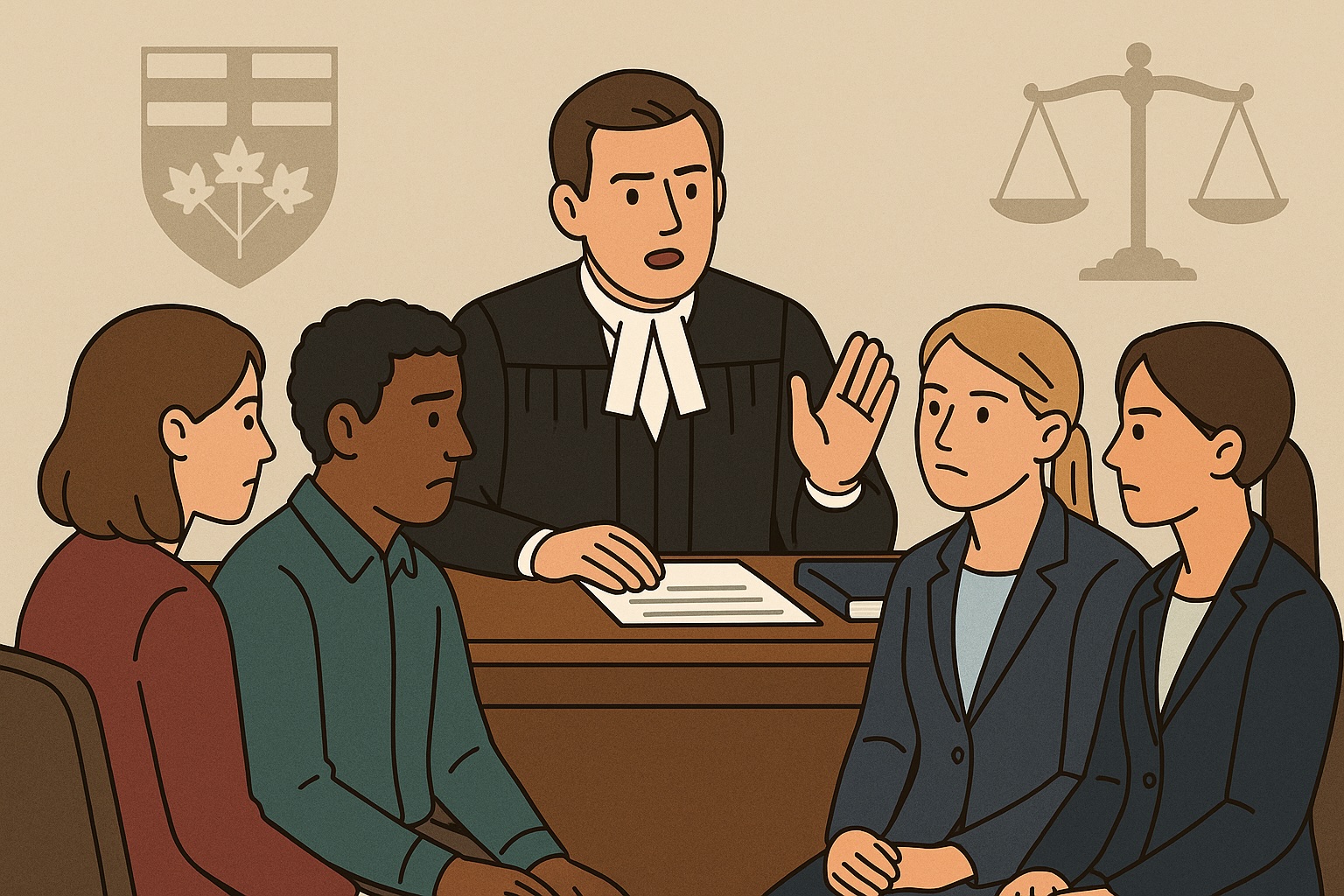What to Expect When Dealing with the Crown Attorney in a Domestic Violence Case (Ontario)
In a domestic violence case in Ontario, the Crown Attorney decides whether charges proceed. Learn what their role is, how they interact with victims and the accused, and what to expect in court.

In Ontario, once someone is charged with **domestic assault or related offences**, the case is taken over by the **Crown Attorney**—a government lawyer who prosecutes criminal cases on behalf of the public.
Whether you're the **accused**, the **victim**, or a **witness**, understanding the Crown’s role is essential to navigating the legal process.
***
### 👨⚖️ What Is the Role of the Crown Attorney?
The Crown Attorney:
* Reviews the **police evidence and witness statements**
* Decides whether the case will **proceed or be withdrawn**
* Represents the government in court
* Makes recommendations on **bail, sentencing, and diversion**
* **Cannot take instructions from the victim** but may consider their wishes
> 📌 The Crown represents the **public interest**, not the individual complainant.
***
### 🙋 If You Are the Victim
#### Can I Speak to the Crown Attorney?
Yes. You may meet with the Crown before trial through:
* A **Victim/Witness Assistance Program (VWAP)** worker
* A scheduled **pre-trial meeting** or **court support session**
#### Will the Crown Drop Charges If I Ask?
Not necessarily. Domestic violence cases in Ontario follow a **"pro-prosecution" policy**, meaning:
* The Crown decides whether to proceed—not the victim
* Charges are **rarely withdrawn** unless evidence is clearly insufficient
> ⚠️ If you recant your statement, you may be called as a **hostile witness** and compelled to testify.
#### What Support Can I Get?
* **VWAP workers** can help explain the process, accompany you to court, and keep you informed
* **Safety planning and restraining orders** may also be discussed with the Crown’s team
***
### 👤 If You Are the Accused
#### Can I Talk to the Crown?
No, not directly—unless:
* You **represent yourself in court**
* Or your **lawyer or duty counsel** speaks on your behalf
The Crown will review:
* Whether there is a **reasonable prospect of conviction**
* Whether **public interest** requires prosecution
#### Will I Get a Plea Offer?
Yes, in many cases. The Crown may offer:
* A **plea to a lesser charge**
* A **peace bond** in exchange for withdrawal of charges
* **Diversion programs** (e.g. Partner Assault Response Program)
> It’s important to **speak with a criminal defence lawyer** before accepting any offer.
***
### 👥 Role of Victim/Witness Assistance Program (VWAP)
VWAP staff work with the Crown to support survivors by:
* Explaining **court orders and bail conditions**
* Coordinating **court dates**
* Providing **emotional support** and referrals
* Arranging **meetings with the Crown** before hearings
***
### 🧾 Summary: Interacting with the Crown Attorney in Domestic Violence Cases
* ✅ The Crown decides whether charges proceed—not the victim
* ✅ Victims may speak to the Crown (via VWAP) but cannot demand withdrawal
* ✅ The accused may communicate through a lawyer or duty counsel
* ✅ The Crown can offer diversion, peace bonds, or plea deals
* ✅ VWAP provides communication support between survivors and the Crown
***
### 📞 Where to Get Help
* **Victim Support Line (Ontario)** – 1-888-579-2888
* **Legal Aid Ontario** – 1-800-668-8258
* **Duty Counsel at the courthouse** – Free legal advice
* **Community Legal Clinics** – Guidance on criminal procedure
* **VWAP Office Directory** – Available at most criminal courthouses
***
### Frequently Asked Questions (FAQs)
#### 1. Who does the Crown Attorney work for in a domestic violence case?
The Crown Attorney is a government lawyer who prosecutes the case on behalf of the public or the "State." They do not work for the victim/complainant.
#### 2. As the victim, can I tell the Crown to drop the charges against my partner?
You can tell the Crown your wishes, but the final decision is theirs alone. In Ontario, there is a strong "pro-prosecution" policy for domestic violence, meaning the Crown will likely continue the case if there is enough evidence, even if you want to reconcile with your partner.
#### 3. What is the Victim/Witness Assistance Program (VWAP)?
VWAP is a government program that supports victims and witnesses through the criminal court process. Your VWAP worker is your main link to the Crown's office. They provide updates on your case, explain court procedures, help you prepare to testify, and connect you with other support services.
#### 4. What happens if I change my story or refuse to testify?
If you recant (take back) your original statement, the Crown may still proceed with the case using other evidence (like the 911 call or photos). A Crown Attorney can also issue a subpoena, which is a court order compelling you to come to court and testify. Refusing to testify after being subpoenaed can have serious legal consequences.
#### 5. What is the PARs Program?
The Partner Assault Response (PARs) Program is a specialized counselling program for people who have used violence in their relationships. As part of a plea deal or a sentence, a Crown Attorney will often require the accused person to complete the 12-week PARs program.
#### 6. As the accused, should I speak directly to the Crown Attorney?
No. It is highly advisable that all your communication with the Crown's office be handled by your criminal defence lawyer or duty counsel. Your lawyer understands the legal process and can negotiate on your behalf to achieve the best possible outcome.
